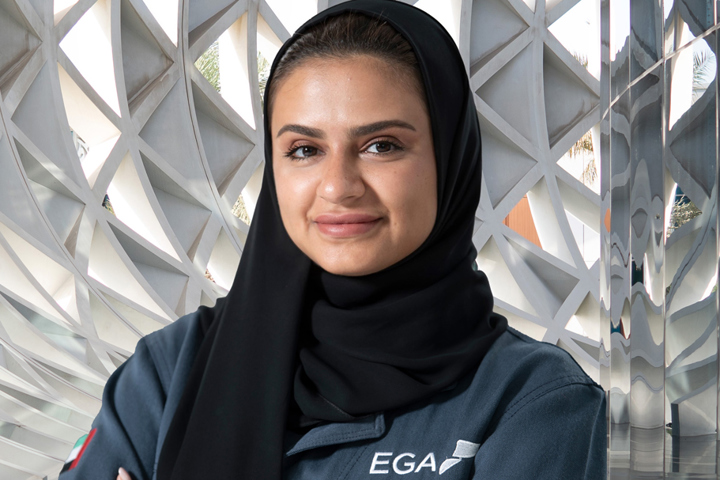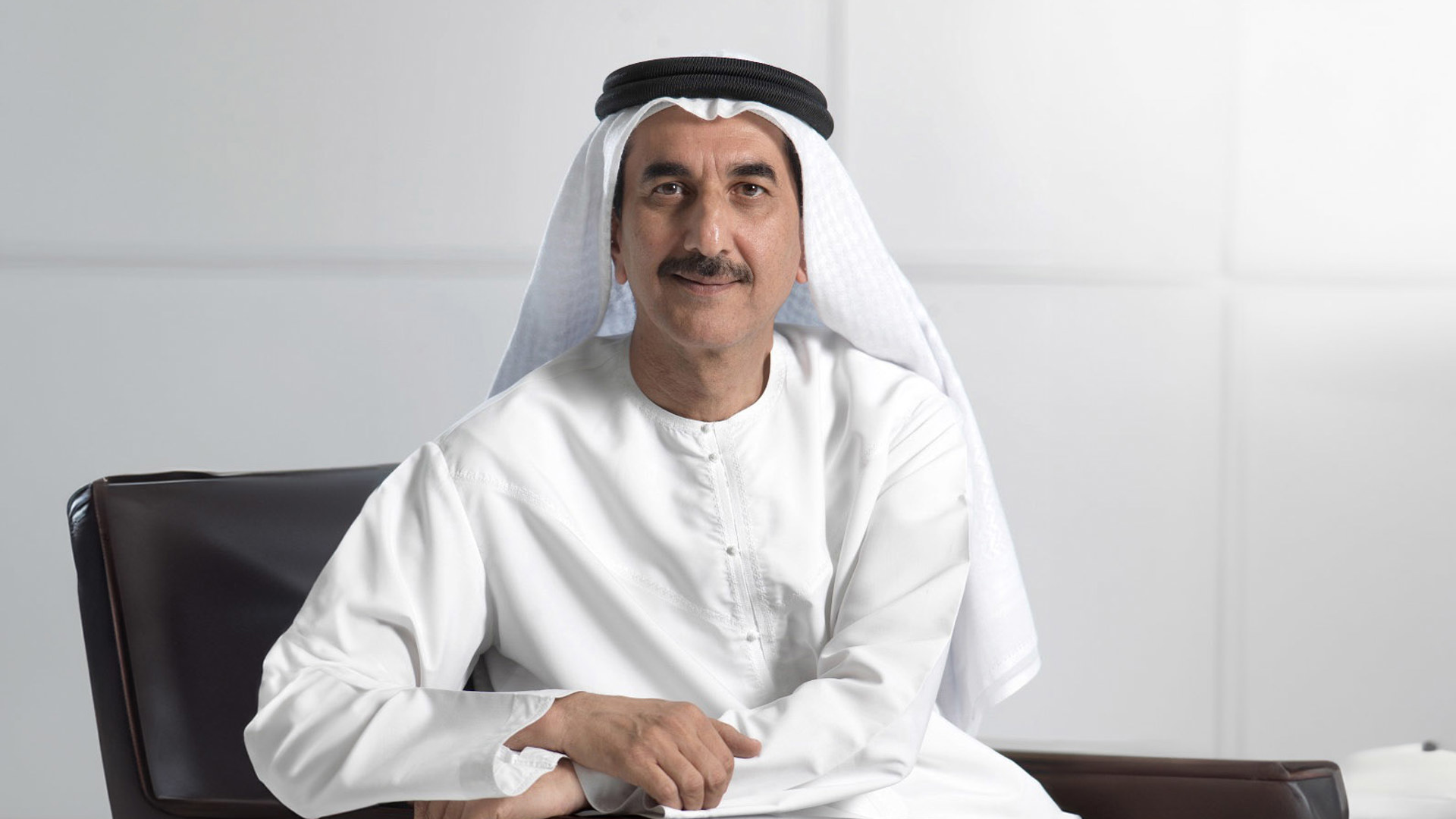
Leaders of tomorrow
From an inspirational meeting with the UAE President to developing, empowering and engaging the leaders of tomorrow, Hala AlHashmi wants the EGA Youth Council to make its mark on the world
Read more
Aluminium production requires a reliable supply of electricity - and it's Tayeb Al Awadhi's job to ensure the power stays on at EGA for decades at a time
Not surprisingly, a conversation with Senior Vice President of Energy, Tayeb Al Awadhi, begins with him talking about how EGA, as a vital UAE industrial company, is sustaining its operations during the Coronavirus pandemic.
Simply put, it’s his job to make sure the power never goes off. Smelting aluminium requires significant amounts of electricity, and prolonged blackouts could put an entire plant in jeopardy. But what it takes to make this happen is far from simple, requiring an almost obsessive focus on improving the availability, reliability and efficiency of power generated by EGA’s power plants in Jebel Ali and Al Taweelah. That means a scrupulous attention to detail and developing contingency plans for every possible scenario to ensure every element of power operations, across both plants, is secure.
“We take no chances,” Tayeb says. This time, however, he’s not just talking about power security. He’s also talking about the coronavirus, and measures put in place to keep EGA’s people and operations safe.
“Our two sites are being cleaned as if they were hospitals,” he continues, explaining that “we observe social distancing at work together, with very strict guidelines over behaviour at home. It's a process of nonstop education as we learn more about the disease.”
Education is a recurring theme in Tayeb’s life. His father, a successful businessman despite the fact he never had the opportunity to pursue formal education, prioritised the learning of his six children. All of them were sent abroad in the 1970s to study, in five different countries.
Tayeb spent eight years in Ireland, where he would ultimately earn a master’s degree in engineering science from Dublin’s prestigious University College. “The experience made me understand what my father meant about education always being a worthwhile investment.”
Back in Dubai, Tayeb joined what was then DUBAL in 1991, starting in the power section where he moved throughout the shop floor departments including operations, maintenance, projects, the carbon plant, casthouse maintenance, central maintenance and engineering before eventually rising to General Manager. Then, in 2014, when EGA was formed as a joint venture between DUBAL and EMAL, he was selected to lead the new company’s energy department. Since then he has served as Senior Vice President Energy, responsible for EGA’s 5,500MW of electricity generation capacity as well as water and air production and high voltage procedures, operations and maintenance throughout the company.
Keeping the Power On
Tayeb’s knowledge, cultivated over years spent studying and working at EGA, is crucial to his role today, in which he oversees the massive gas-powered turbines EGA uses to produce the vast amount of electricity required for its two plants. Together, these turbines produce more electricity than the generation fleets of some countries, such as Ireland or Hungary. In an emergency, the gas-powered turbines can also run on diesel fuel. However, Tayeb explains, diesel is a last-resort alternative because it is, more costly than gas and much less clean.
In addition to these fuel-contingency plans, Tayeb must also ensure that any power interruptions are as short as possible. The alternative is an almost unthinkable “worst-case scenario.” If EGA were to lose power for just three hours, he explains, then molten aluminium would freeze in the pots, resulting in a three-to-six-month shutdown—not to mention, a massive clean-up operation. It is Tayeb and his team’s job to ensure that never happens.
“We are constantly on our toes thinking about potential problems. It has happened many times that you get a call at 2am, or on a Friday afternoon when you are in the cinema with your family, and you need to go back to work. Our role is to ensure 24/7 power reliability and availability, 365 days a year— and we have been very successful. But this success hasn’t been easy. It’s required a lot of investment—both in time and money—and many infrastructure updates.”
“So,” he laughs, “you can imagine how this work constantly occupies my mind.”
Asked for an example of when something has gone wrong, he remembers a major cable between two substations breaking, causing an imbalance to the load flow. Over the years, Tayeb has also faced occasional major gas valve faults, the fixing of which requires that the machines to be switched over, one by one, to diesel fuel.
“But,” says Tayeb, “the good thing is, we have always been able to bring the team together very quickly and restore power. So, even in cases where we’ve lost power for a couple of hours, we’ve always been able to get it fixed effectively.”
Saving Energy
Of course, it’s rare for “something to go wrong” in an operation that runs 24 hours a day throughout the year. Mostly, Tayeb’s constant focus is on finding new ways to drive efficiencies through innovative technologies.
Take gas turbines, for instance. Gas turbines require a massive intake of air to run, and if that air isn’t clean, it affects performance. Recognising an opportunity to enhance performance, Tayeb and his team worked with others across the company to make EGA the first in the region to change from single-stage filtration to three-stage filtration, developing a home-grown approach for EGA that has since been adopted by others.
Tayeb also explains how cool air is denser than hot air, which is better for gas turbine performance. During the heat of summer, he says power production can drop by up to 20 per cent. His solution was to install an evaporative cooling system that had a one-year payback.
Cleaner air and good maintenance have also been game changers for the lifespan of EGA’s compressor turbine blades. EGA has been very successful in extending period of maintenance for gas turbines resulting in savings of over $24 million over the past decade.
Another great power and money-saving innovation by EGA’s Energy department comes from one of the turbine’s by products—water. The turbines produce hot gasses, which in cold countries are used for heat. But there’s seldom (if ever) a need for central heating in the UAE so, instead, EGA converts these hot gasses to steam. With this steam, EGA generates pure water, a small amount of which is sold to manufacturers in the sugar, perfume, health and medical industries. What remains of the pure water is then infused with minerals and cleaning to create up to 30 million imperial gallons of drinking water per day.
One of the innovative approaches that has been implemented in EGA is using eight tones per hour of steam in “absorption chillers”, which cool the three-storey office building of the desalination department.
Passing on Experience
Tayeb speaks with pride of these achievements and enjoys the opportunity to share his considerable knowledge and experience Indeed, he serves on several committees, including between EGA and power utilities. Of this willingness to share information, he notes that the work of EGA’s Energy department “is purely technical because we don’t sell power, so we aren’t competitors. The steering committee does a fantastic job. They’re always two steps ahead –they think ten years ahead, they have a vision for the future, and we have all learned a lot from each other.”
In addition to the steering committee, Tayeb has also served an active member of the Mohammed bin Rashid Al Maktoum Solar Park project and has quite a lot to say about the potential for solar energy. “The cost has come down dramatically in the past ten years, so many industries are switching over to it. The disadvantage is that it is only available when there is sun, so what do you do after sunset? In the UAE the load comes down a lot at night when the offices go home, so this suits the solar industry. But EGA is 24-hour operation and I can’t rely on it. If you switch on your gas turbines every night and then off again the next day this is not good as it leads to higher maintenance.”
However, he says this may soon change, citing the emergence of Concentrated Solar Power (CSP) which produces steam that can be available 24 hours. “It’s more costly than gas, but the day will come when CSP is cheaper and will make sense to EGA.” Asked when that day might come, he makes a bold prediction. “I see it happening it in the next five years. That’s my vision.”
Taking Work Home
Obviously, Tayeb is passionate about his work. But if there were any doubt, just take a quick look at his CV, which lists “reading” and “involvement in energy optimization measures” as his hobbies.
When asked if he is the sort of person who goes home and turns off unnecessary lights, he laughs in agreement. “Unfortunately, I am that person! When my children were younger, I’d deduct their pocket money for leaving lights on and give them bonuses for turning them off. Needless to say, they very quickly understood the language of money. It encouraged good habits.”
This prompts him to reminisce about the time he and his son installed a solar water-heater for the family home bathrooms. “He was so proud of this, but I had to teach him that the payback was seven years and that the ROI ideally must be three to five years. But I told him it was a great project and a lifelong learning project. It made him understand how projects work and how to calculate Investment Rates of Return at grade 11. We would compare DEWA utility bills and total project cost to assess how our investment in the project was performing.”
Finally, Tayeb muses on why he has stayed at EGA for almost 30 years. “You have the opportunity to shine and grow here. At EGA, ideas are respected—especially by those at the top. Everyone who adds value to the business must climb the ladder. No one goes straight to management from outside. We all start from the shop floor. We also respect each other’s cultural values and take care of our employees. We all have two families—one family at home and one family here, called EGA.”